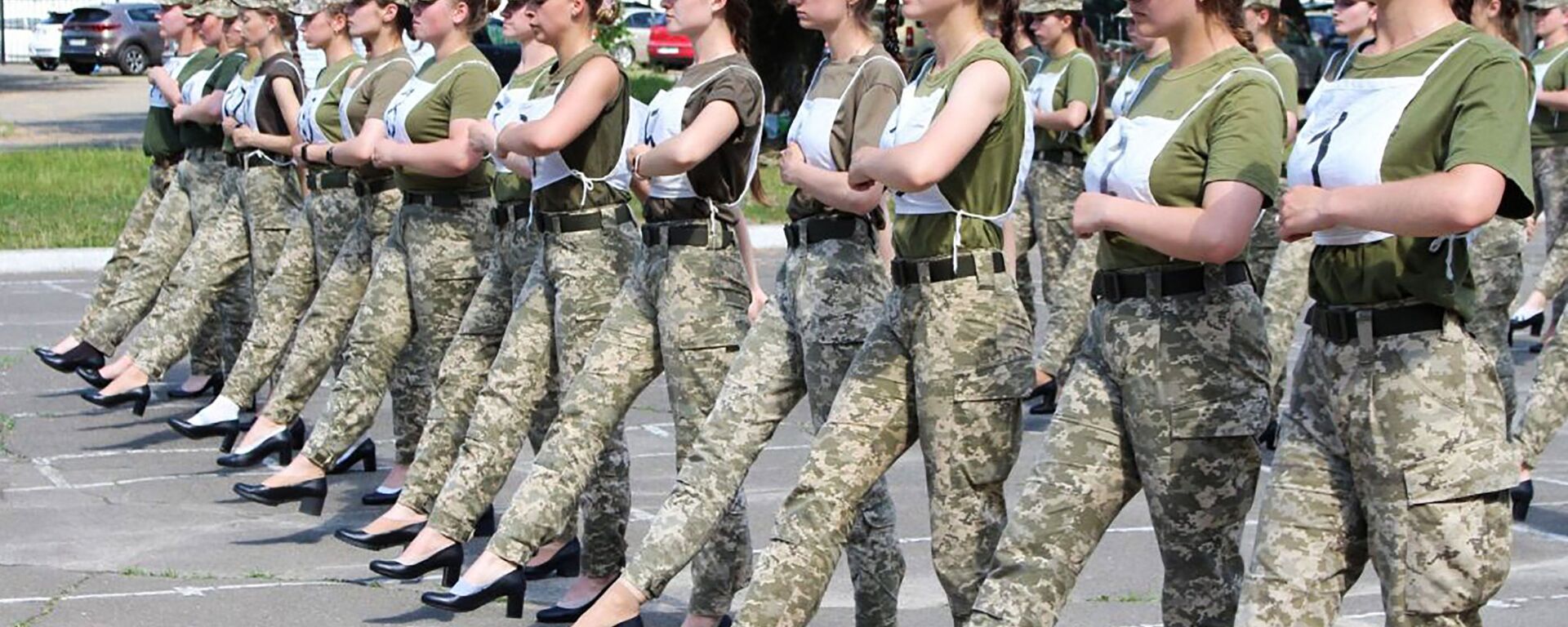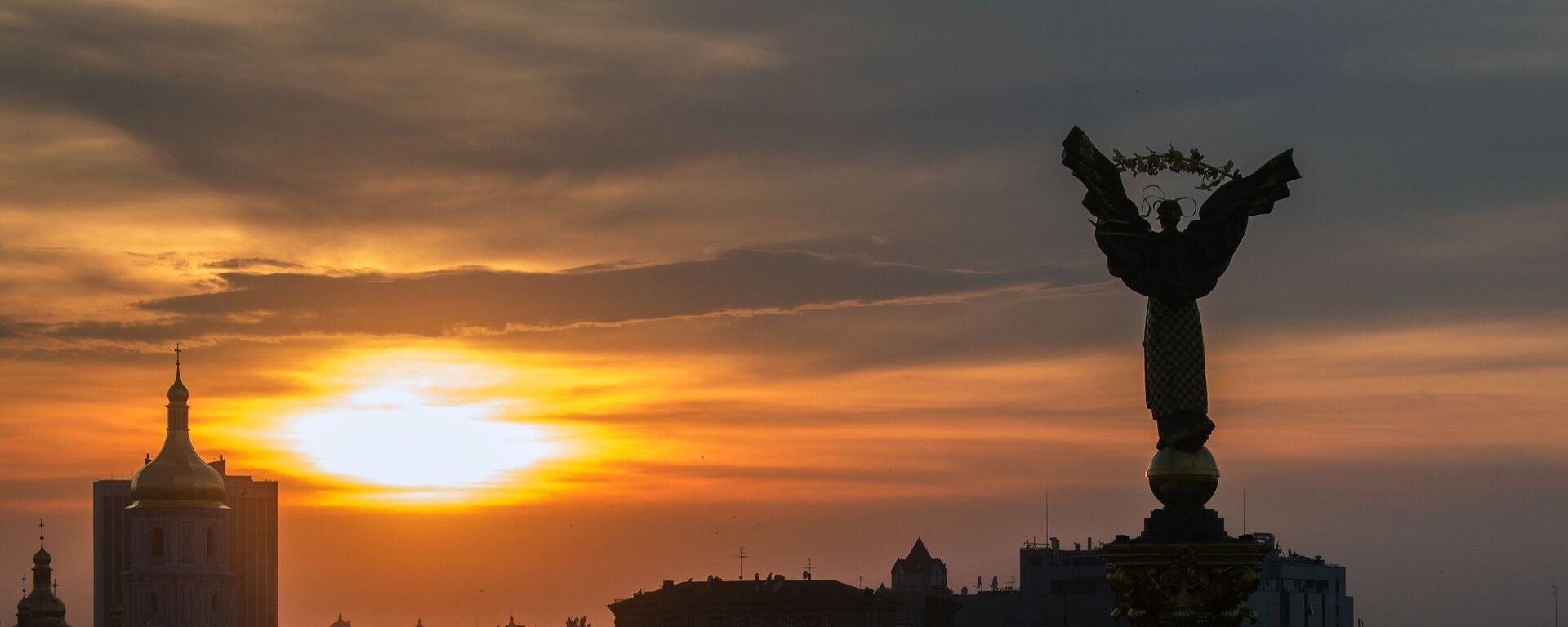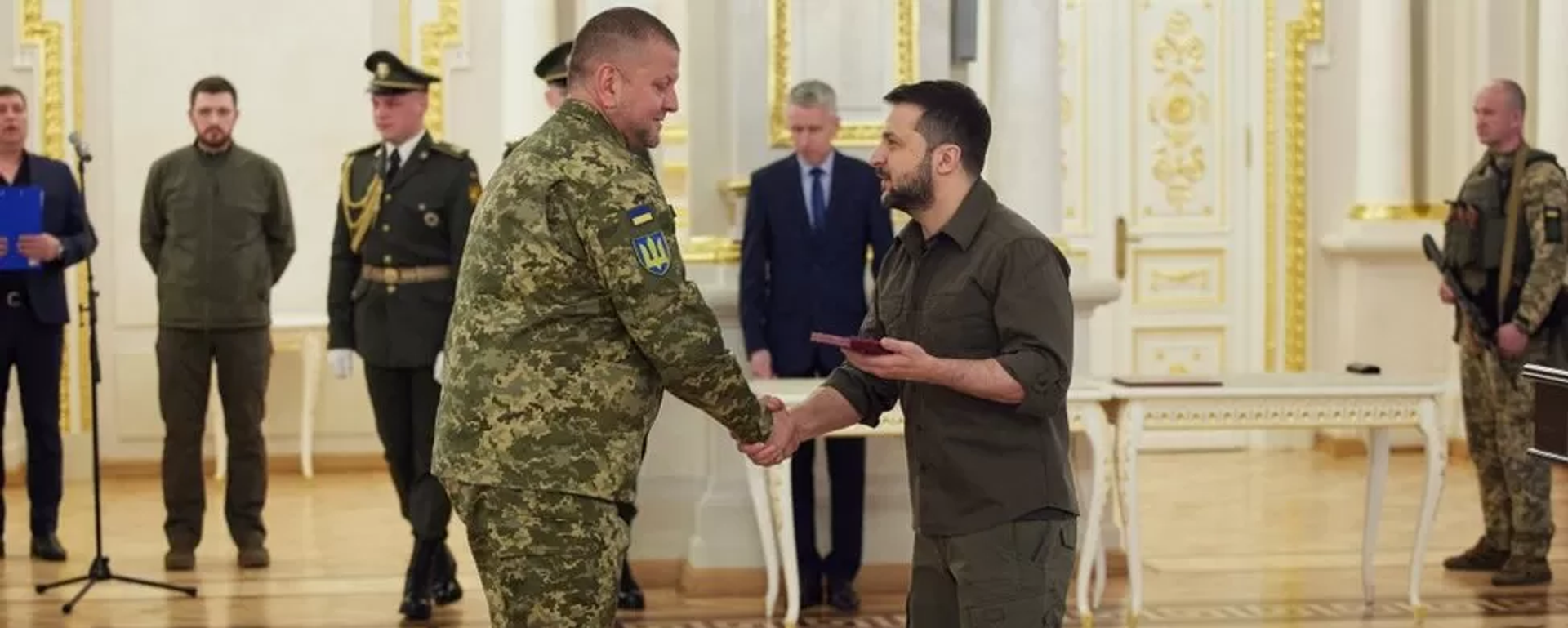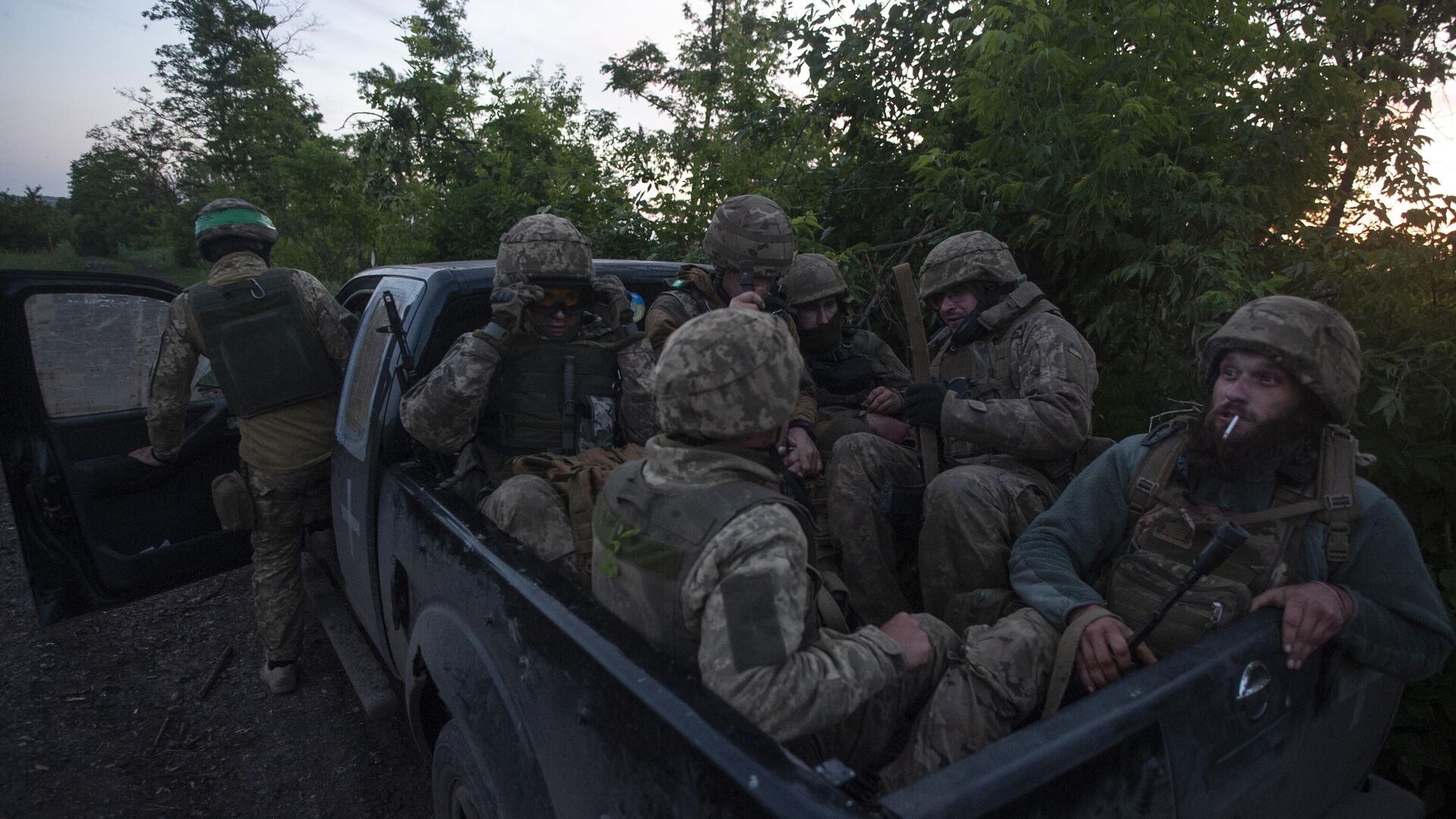https://sputnikglobe.com/20231226/how-new-mobilization-law-could-buy-time-for-zelensky-with-thousands-of-lives-1115824209.html
How New Mobilization Law Could Buy Time for Zelensky With Thousands of Lives
How New Mobilization Law Could Buy Time for Zelensky With Thousands of Lives
Sputnik International
A bill to change the drafting rules in Ukraine has been introduced to the Verkhovna Rada, the Ukrainian parliament, triggering controversy.
2023-12-26T18:58+0000
2023-12-26T18:58+0000
2023-12-26T18:58+0000
europe
ukraine
volodymyr zelensky
draft
mobilization
analysis
ukrainian counteroffensive attempt
women
ukrainian army
valery zaluzhny
https://cdn1.img.sputnikglobe.com/img/07e7/0a/15/1114390850_0:0:3077:1731_1920x0_80_0_0_554613b8b2725b3f0ed7768ea7246c55.jpg
The Ukrainian government has submitted draft legislation on "improving certain issues of mobilization, military registration and military service" to the Verkhovna Rada.Under the bill, several categories of Ukrainian citizens have the right to defer their draft, including "pregnant women and women on maternity leave." In November, the US press drew attention to the Kiev regime's effort to mobilize more female recruits.However, on December 18, Ukrainian MP from the Servant of the People party Maryana Bezuglaya argued on Facebook* that the country needed to draft more women. "Women registered with the military may be called up for military service or recruited to perform work to ensure the defense of the state in wartime," she wrote.Around 43,000 women now serve in the nation's armed forces (a 40% increase since 2021), according to the Ukrainian Ministry of Defense. Moreover, the Ukrainian Armed Forces canceled restrictions which prevented female recruits from serving as machine gunners, tank commanders, snipers and truck drivers.According to the draft legislation, some people with disabilities (particularly "group III" that corresponds to partial disability) may now be drafted.If drafters and reservists fail to fulfill the law's requirements, they could be placed into the Unified Register of Debtors and punitive measures would be applied to them. Those measures include, in particular, a ban on traveling abroad; conducting transactions with property; obtaining a driver’s license and driving a car; or receiving credits and loans, to name but a few.While the bill appears to crack down on draft dodges and diminish the rights of those already mobilized, Solonnikov does not expect any social turmoil in Ukraine over the legislation. Instead, there would be a sort of a "silent protest."At a press conference on December 19, Zelensky touched upon the topic of a new large-scale mobilization for the first time. The Ukrainian president said that he had been approached by the General Staff of the Ukrainian Armed Forces with a request to mobilize an additional 450,000-500,000 people.However, following Zelensky's announcement, Commander-in-Chief Gen. Valery Zaluzhny told a Ukrainian broadcaster that the military command did not make such a request.The proposed law is likely to become unpopular with the Ukrainian public following several waves of mobilization and huge human losses on the battlefield. Apparently, the Ukrainian president is seeking to shift responsibility for a new mobilization effort on the Ukrainian top commandment.The Eastern European state has been under martial law since February 24, 2022, while Zelensky's decree on general mobilization forbade leaving the country for men between 18 and 60.Solonnikov explained that the Kiev regime needs human resources to fill gaps at the front while seasoned military officers would undergo training for potential new missions. The Ukrainian Armed Forces have lost more than 125,000 soldiers and 16,000 units of various weapons over six months of the much-anticipated counteroffensive, as per the Russian Ministry of Defense."[For their part], combat units are preparing for some further events. Let's wait and see what those events will be. And now they have exactly the same task - to replace men in those places where women can also do the job - some technical personnel, some kind of service. It's the same with people with disabilities. If a person’s life on the frontline lasts for a few days, then what difference does it make whether he is a disabled person of the third group or just an elderly person? All of them would live for a few days," Solonnikov continued.From the military viewpoint, Ukraine is going on the defensive and needs to buy some time, he suggested, adding that the Kiev regime presently tries to maintain the status quo on the battlefield and prevent the advance of Russian troops.*Facebook is banned in Russia for extremist activities.
https://sputnikglobe.com/20231108/ukrainian-women-to-be-zelenskys-new-cannon-fodder-1114818359.html
https://sputnikglobe.com/20231220/suppression-of-minorities-and-press-freedom-puts-paid-to-ukraine-future--professor-1115702676.html
https://sputnikglobe.com/20231219/spying-devices-found-inside-zaluzhnys-office-sign-of-growing-chaos-within-kiev-regime-1115673835.html
ukraine
Sputnik International
feedback@sputniknews.com
+74956456601
MIA „Rossiya Segodnya“
2023
News
en_EN
Sputnik International
feedback@sputniknews.com
+74956456601
MIA „Rossiya Segodnya“
Sputnik International
feedback@sputniknews.com
+74956456601
MIA „Rossiya Segodnya“
ukraine, ukrainian parliament, new mobilization bill, zelensky government bill on mobilization, ukrainian mobilization, draft dodgers, war in ukraine, ukrainian failed counteroffensive, volodymyr zelensky, valery zaluzhny
ukraine, ukrainian parliament, new mobilization bill, zelensky government bill on mobilization, ukrainian mobilization, draft dodgers, war in ukraine, ukrainian failed counteroffensive, volodymyr zelensky, valery zaluzhny
How New Mobilization Law Could Buy Time for Zelensky With Thousands of Lives
A bill to change the drafting rules in Ukraine has been introduced to the Verkhovna Rada, the Ukrainian parliament, triggering controversy.
The Ukrainian government has submitted draft legislation on "improving certain issues of mobilization, military registration and military service" to the Verkhovna Rada.
Under the bill, several categories of Ukrainian citizens have the right to defer their draft, including "pregnant women and women on maternity leave." In November, the US press drew attention to the Kiev regime's effort to mobilize more female recruits.
However, on December 18, Ukrainian MP from the Servant of the People party Maryana Bezuglaya argued on Facebook* that the country needed to draft more women. "Women registered with the military may be called up for military service or recruited to perform work to ensure the defense of the state in wartime," she wrote.
Around
43,000 women now serve in the nation's armed forces (a 40% increase since 2021), according to the Ukrainian Ministry of Defense. Moreover, the Ukrainian Armed Forces canceled restrictions which prevented female recruits from serving as machine gunners, tank commanders, snipers and truck drivers.

8 November 2023, 14:29 GMT
According to the draft legislation, some people with disabilities (particularly "group III" that corresponds to partial disability) may now be drafted.
In addition, the bill envisages lowering the draft age for men with no military experience from 27 to 25, after which they will not be subject to conscription for military service, but to mobilization. It likewise eliminates conscript service and transferal of all conscripts to the reserve, and brings in basic combined arms training for up to three months for all citizens of Ukraine aged 18–25 years.
If drafters and reservists fail to fulfill the law's requirements, they could be placed into the Unified Register of Debtors and punitive measures would be applied to them. Those measures include, in particular, a ban on traveling abroad; conducting transactions with property; obtaining a driver’s license and driving a car; or receiving credits and loans, to name but a few.
"I think this law will be adopted," Dmitri Solonnikov, a political analyst and director of the Institute for Contemporary State Development, told Sputnik. "If the leadership of Ukraine considers it necessary to pass this or that legislative act, then President Zelensky’s party, the Servant of the People, having a majority, passes laws virtually automatically. And therefore I think that there will be no organizational difficulties."

20 December 2023, 13:15 GMT
While the bill appears to crack down on draft dodges and diminish the rights of those already mobilized, Solonnikov does not expect any social turmoil in Ukraine over the legislation. Instead, there would be a sort of a "silent protest."
"Nothing fundamentally will change," the expert noted. "Attempts to leave Ukraine will continue. Both women and disabled people would possibly try to leave Ukraine. (…) In a silent movement in all directions, Ukrainian society will fall apart."
At a press conference on December 19, Zelensky touched upon the topic of a new large-scale mobilization for the first time. The Ukrainian president said that he had been approached by the General Staff of the Ukrainian Armed Forces with a request to mobilize an additional 450,000-500,000 people.
However, following Zelensky's announcement, Commander-in-Chief Gen. Valery Zaluzhny told a Ukrainian broadcaster that the military command did not make such a request.

19 December 2023, 03:30 GMT
The proposed law is likely to become unpopular with the Ukrainian public following several waves of mobilization and huge human losses on the battlefield. Apparently, the Ukrainian president is seeking to shift responsibility for a new mobilization effort on the Ukrainian top commandment.
The Eastern European state has been under martial law since February 24, 2022, while Zelensky's decree on general mobilization forbade leaving the country for men between 18 and 60.
Solonnikov explained that the Kiev regime needs human resources to fill gaps at the front while seasoned military officers would undergo training for potential new missions. The Ukrainian Armed Forces have lost
more than 125,000 soldiers and 16,000 units of various weapons over six months of
the much-anticipated counteroffensive, as per the Russian Ministry of Defense.
"As military experts say, the main combat-trained units have been withdrawn from the frontline and are undergoing re-equipment and retraining," the expert said. "And cannon fodder – these teenagers and veterans – are thrown to the front line, where they die in the thousands and tens of thousands, and [the Kiev regime] doesn’t feel sorry for them."
"[For their part], combat units are preparing for some further events. Let's wait and see what those events will be. And now they have exactly the same task - to replace men in those places where women can also do the job - some technical personnel, some kind of service. It's the same with people with disabilities. If a person’s life on the frontline lasts for a few days, then what difference does it make whether he is a disabled person of the third group or just an elderly person? All of them would live for a few days," Solonnikov continued.
From the military viewpoint, Ukraine is going on the defensive and needs to buy some time, he suggested, adding that the Kiev regime presently tries to maintain the status quo on the battlefield and prevent the advance of Russian troops.
"This time is bought due to the death of tens of thousands of recruits, whom [the Ukrainian elites] do not feel sorry for. Well, now they will be dispatched to the frontline en masse. So this is Ukraine’s strategy in a nutshell," Solonnikov concluded.
*Facebook is banned in Russia for extremist activities.





